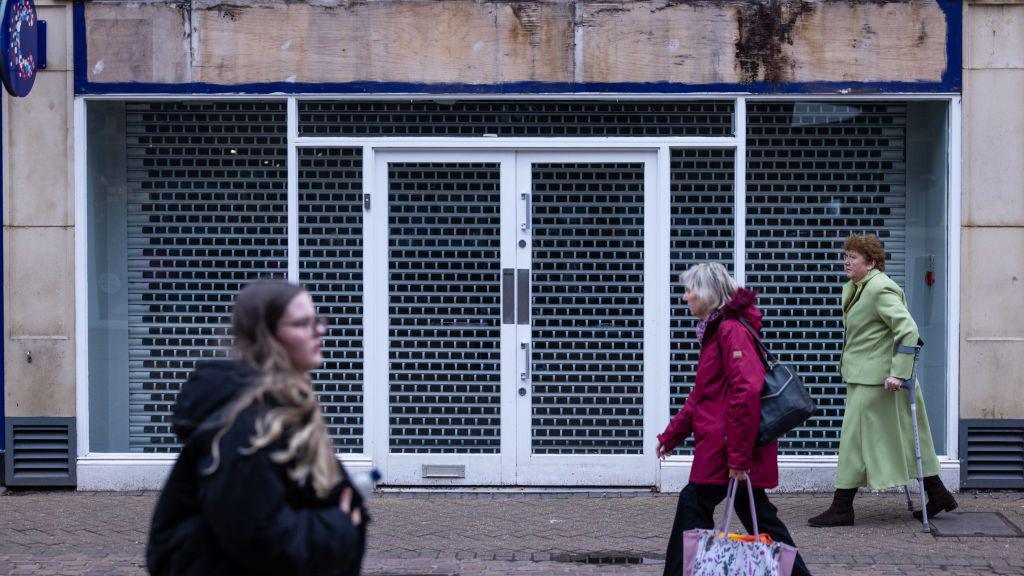Warning retail job cuts ‘inevitable’ after Budget

- Published
High Street job losses are "inevitable", prices will rise, and shops will close because of tax rises in the Budget and other rising costs, a group of the biggest retailers in the UK is warning.
Tesco, Amazon, Greggs, Next and dozens of other chains are urging the Treasury to reconsider some of the measures.
In a letter to Chancellor Rachel Reeves, external, they said the "cumulative burden" of the Budget changes and other policies already in the pipeline will add billions in costs to a sector with a 3% to 5% profit margin.
A Treasury spokesperson said it had had to "make difficult choices to fix the foundations of the country", while one union called the letter "pathetic".
Bank of England governor Andrew Bailey told the Treasury Committee on Tuesday he had seen the letter and it was "right" to say jobs could be affected.
He said the employer National Insurance (NI) tax rise from the Budget could mean higher inflation, lower wage growth, or higher unemployment, adding in written evidence to the committee the Bank will be "gradual" on interest rate cuts as a result.
Measures in the Budget, in particular the employer NI increase, have been met with a tide of criticism from business, who argue it will hold back growth.
But concerns have been loudest among retailers and hospitality businesses, where many young people find their first jobs. Firms in those sectors are also facing higher costs from next year's rise in the minimum wage.
Though many individual retailers have already spoken out, this letter marks the first time so many have done so together.
The 81 signatories of the letter range from big British retailers - such as Aldi, Asda, Boots, Currys, John Lewis, Lidl, Marks & Spencer, Primark and Sainsbury's - to charity shop group the British Heart Foundation and trade group Associated Independent Stores.
The government has defended its tax rises as necessary to avoid cuts to public services, and the rise in the minimum wage, with a bigger boost for younger workers and apprentices, has been welcomed by trades unions.
The letter from the businesses belonging to the British Retail Consortium (BRC) said: "The sheer scale of new costs and the speed with which they occur create a cumulative burden that will make job losses inevitable, and higher prices a certainty."
It calculated the changes would add over £7bn a year in costs, adding it would "not be possible to absorb such significant cost increases over such a short timescale".
"The effect will be to increase inflation, slow pay growth, cause shop closures, and reduce jobs, especially at the entry level."
However, Nadine Houghton, GMB Union national officer, said larger businesses "pleading poverty" was "utterly pathetic".
“Most of these companies’ fortunes are already subsidised by the taxpayer. They pay very low wages which then have to be topped up by in-work benefits," she added.
“It’s only right that they should now contribute a bit more to rebuilding our country.”
Taxes and costs
From next April, all large businesses will have to pay higher National Insurance Contributions (NICs) for every member of staff they employ.
Employer NICs will start at a lower threshold than now, at £5,000 instead of £9,100, and the rate will rise from 13.8% to 15%. The BRC calculates this will cost British retailers £2.33bn a year.
The rise in the minimum wage from April is set to cost the sector a further £2.73bn, the BRC letter said.
In addition, from October 2025 a new packaging levy comes into force.
Introduced by the previous government, the extended producer responsibility (EPR) scheme shifts the cost of recycling from local councils onto the companies that use the packaging. Smaller firms are exempt, but the new levy will cost the retail sector overall another £2bn, the BRC estimates.
Sainsbury's and M&S warn Budget may push up prices
- Published7 November 2024
JD Sports boss warns prices will rise due to Budget
- Published13 November 2024
Reeves 'not immune' to criticism over NI hike
- Published3 November 2024
Retail analyst Catherine Shuttleworth said the Budget changes "will in some cases wipe out profits and in most cases significantly reduce profits, which will in the short-to-medium term risk more jobs if retailers cannot find alternative ways to save costs".
Nick Stowe, the chief executive of High Street fashion stores Monsoon and Accessorize, told the BBC he was going to have to "divert investment" from opening more shops to protecting its current shops.
Mr Stowe, who signed the BRC letter, said the sector was being forced into things which run counter to the government's growth agenda.
Mark Neale, the boss of outdoor retailer Mountain Warehouse, who also signed the letter, told the BBC he would "prefer to pay more tax by growing the business".
The letter from the retailers calls for the government to phase in the introduction of the NI changes and delay the start of the EPR.
It urges the government to reduce business rates, a property-related tax which the BRC says will cost retailers an additional £140m a year after next April, though there is a 40% relief available for 250,000 premises.
The Treasury said that thanks to exemptions for smaller businesses, "more than half of employers will either see a cut or no change in their national insurance bills [and] there will be £22.6bn more for the NHS".
A business update from Begbies Traynor on Monday, external gave some weight to the BRC's warnings. The consultancy predicted more firms in financial difficulty would need its insolvency advice due to both the NI change and higher interest rates.
Get in touch
Have you been affected by the issues raised in this story?